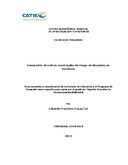| dc.contributor.author | Pacay Tot, Eduardo F. | |
| dc.date.accessioned | 2015-08-27T15:12:29Z | |
| dc.date.available | 2015-08-27T15:12:29Z | |
| dc.date.issued | 2015 | |
| dc.identifier.uri | https://repositorio.catie.ac.cr/handle/11554/7207 | |
| dc.description | Tesis (Mag. Sc.) -- CATIE, 2015 | es_ES |
| dc.description.abstract | Honduras es uno de los países con mayor incidencia de eventos extremos climáticos en la región centroamericana. Sus condiciones sociales, económicas y ambientales hacen que sea un país muy vulnerable a la ocurrencia de desastres. Es por ello que, a partir de información empírica, este estudio determina la importancia de algunas variables socioeconómicas, geográficas y biofísicas en la ocurrencia de desastres ocasionados por eventos extremos de precipitación. Se determinó que el efecto de las variables estudiadas sobre la ocurrencia de desastres puede variar significativamente con la magnitud de la anomalía de precipitación. Por ejemplo, la cobertura de bosque, la pendiente y la escorrentía promedio por municipio tienen efecto únicamente cuando ocurre un evento anómalo de precipitación. Sin embargo, otras variables afectan la probabilidad de desastres aunque no haya anomalías. Por ejemplo, la población, la fracción de la población urbana y el porcentaje de necesidades básicas insatisfechas de vivienda incrementan los desastres incluso sin que exista un evento anómalo. Además, se encontró que el riesgo de desastres varía temporalmente y de acuerdo con la magnitud de la anomalía. Como es de esperar, anomalías en los meses lluviosos son las que tienen más efecto en el incremento de desastres, siendo octubre el mes con más riesgo. Estos resultados fueron robustos para diferentes especificaciones econométricas. Los municipios de Honduras que poseen más riesgo de desastres por eventos extremos de precipitación son el Distrito Central, Choluteca, El Progreso, Marcovia, El Triunfo, Nacaome, Puerto Lempira, San Lorenzo, San Pedro Sula y Juticalpa. El orden de los municipios con más riesgo también fue robusto para diferentes especificaciones del índice. | es_ES |
| dc.description.abstract | Honduras is one of the countries in Central America with the highest incidence of extreme weather events. Their social, economic and environmental conditions make Honduras vulnerable to the occurrence of disasters. Due to the empirical data found in this study, the importance of some variable such as, socio-economic, geographic and biophysical in the occurrence of disasters caused by extreme precipitation has been determined crucial. It was determined that the effect of the variables on the occurrence of disasters can vary significantly with regards to the magnitude of the anomaly of precipitation. For example, forest cover, slopes, and average runoff per municipality have an effect only when an anomalous precipitation event occurs. However, other variables affect the probability of disaster even in the absence of abnormalities. For example, the population, the divided urban population, and the percentage of unsatisfied basic house needs, increase disasters even in the absence of an abnormal event. In addition, we found that disaster risk varies temporarily according to the magnitude of the anomaly. As expected, anomalies in the rainy months are those that have most disastrous impacts, October being the month at most risk. These results were robust for different econometric specifications. The Municipalities of Honduras that have highest disaster risk by extreme precipitation are the Central District, Choluteca, El Progreso, Marcovia, El Triunfo, Nacaome, Puerto Lempira, San Lorenzo, San Pedro Sula, and Juticalpa. The order of the municipalities at highest risk was also found to be significant to different specifications of the index. | en_EN |
| dc.language.iso | es | es_ES |
| dc.publisher | CATIE, Turrialba (Costa Rica) | es_ES |
| dc.relation.ispartof | Maestría en Socioeconomía Ambiental | |
| dc.subject | DESASTRES NATURALES | |
| dc.subject | EVALUACION DE RIESGOS | |
| dc.subject | MODELOS ECONOMETRICOS | |
| dc.subject | GESTION DE RIESGOS | |
| dc.subject | FACTORES DE RIESGO | |
| dc.subject | PRECIPITACION ATMOSFERICA | |
| dc.subject | SOCIOLOGIA ECONOMICA | |
| dc.subject | HONDURAS | |
| dc.title | Generación de índices municipales de riesgo de desastres en Honduras | es_ES |
| dc.type | Tesis de maestría | es_ES |
| dcterms.rights | acceso abierto | es_ES |
| dc.identifier.publisher | CATIE | es_ES |
| dc.identifier.publication | CATIE | es_ES |


